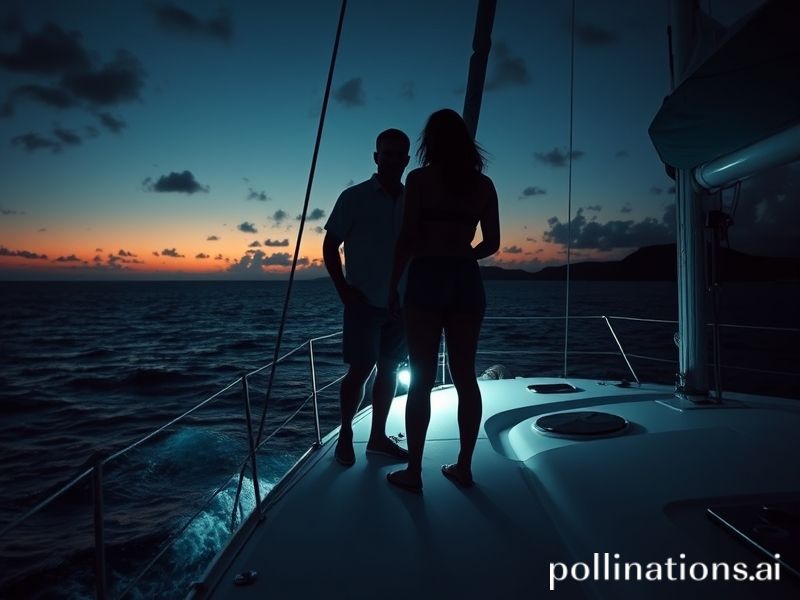Missing at Sea, Viral by Design: How One Yacht Became the World’s Bleakest Tourist Attraction
A Yacht, a Missing Brit, and the Eternal Optimism of the Guilty
The small island of St. John, USVI—population 4,170 and one functioning ATM—has spent the past three years playing unwilling host to a reality-TV pilot nobody asked for. Starring: Ryan Bane, American boat owner and amateur bodyguard to the stars; Sarm Heslop, British former flight attendant who vanished from Bane’s 47-foot catamaran Siren Song on 8 March 2021; and a global audience that has learned to binge true-crime faster than Netflix can green-light it.
From the moment Heslop’s friends sounded the alarm, the case sailed straight past local gossip and into the geopolitical slipstream. Britain’s Foreign Office issued the mandatory “supporting the family” press line—diplomat-speak for “please don’t ask us to send a gunboat.” Meanwhile, across the Atlantic, the FBI politely pretended the Caribbean is still a U.S. lake and offered “technical assistance,” which turned out to be satellite imagery and the faint hope that someone in Washington remembered where the file was saved.
For the rest of us, the story is less whodunit than why-do-we-care. The answer, of course, is that Heslop’s disappearance is a perfect allegory for the age of performative empathy. Every hashtag, every Change-dot-org petition, every Instagram infographic shared from a beach club in Bali is a small, biodegradable raft of conscience, launched with the unspoken prayer that it will reach port before we sober up. The planet’s attention span is now officially shorter than the average yacht charter, yet somehow this particular tragedy keeps bobbing back onto our timelines like a message in a plastic bottle—readable, regrettable, and ultimately destined to become someone else’s problem.
International legal experts—those cheerful souls who bill by the nautical mile—note that the case sits in a Bermuda Triangle of jurisdiction. The boat is flagged in the United States, the presumed victim is British, the last known location is in the Virgin Islands’ territorial waters, and the only person who definitely knows what happened is exercising his constitutional right to remain both silent and extraordinarily tanned. Maritime law, a discipline that still cites precedents from the age of sextants and scurvy, offers little guidance beyond “try not to lose anyone overboard.” The result is a three-year stalemate that makes Brexit negotiations look brisk.
Global implications? Start with the tourism brochures. The USVI’s official slogan is “America’s Caribbean,” a phrase that now carries the faint whiff of “Florida with prettier water and fewer consequences.” Over in Europe, the Foreign Office has quietly upgraded its travel advice from “take care after dark” to “maybe just go to Portugal.” Yacht-charter companies have begun inserting clauses that read like prenups for the paranoid: “Passenger acknowledges ocean is large, indifferent, and possibly TikTok famous.”
Meanwhile, the cottage industry of amateur sleuths keeps churning. Podcasters from Perth to Portland have devoted entire seasons to grainy CCTV, mysterious phone pings, and the ever-popular “he changed his Facebook status too quickly” theory. Each new episode is accompanied by a merch drop, because nothing says justice like a $28 hoodie emblazoned with nautical coordinates. The algorithm, that tireless sommelier of human misery, pairs the case with ads for life insurance and waterproof luggage—suggestions so on-the-nose they could qualify as satire if they weren’t making real money.
At the heart of it all is the quietly horrifying possibility that the world’s collective outrage is simply another luxury consumable, like single-origin coffee or carbon offsets. We demand answers the way we demand sustainable seafood: fervently, briefly, and only until the next course arrives. Sarm Heslop’s family still waits on a dock that grows no closer, while the rest of us scroll on, confident that if the ocean ever gives up its secret, the push notification will be emblazoned with just the right amount of righteous indignation.
And Ryan Bane? He reportedly still sails the same turquoise circuit, a free man in a forgiving climate, proof that the only thing more buoyant than a fiberglass hull is the presumption of innocence. Somewhere between the devil and the deep blue sea, the rest of us drift along, buoyed by the faint, ridiculous hope that next time the script will be different—even though we already know the ending by heart.







